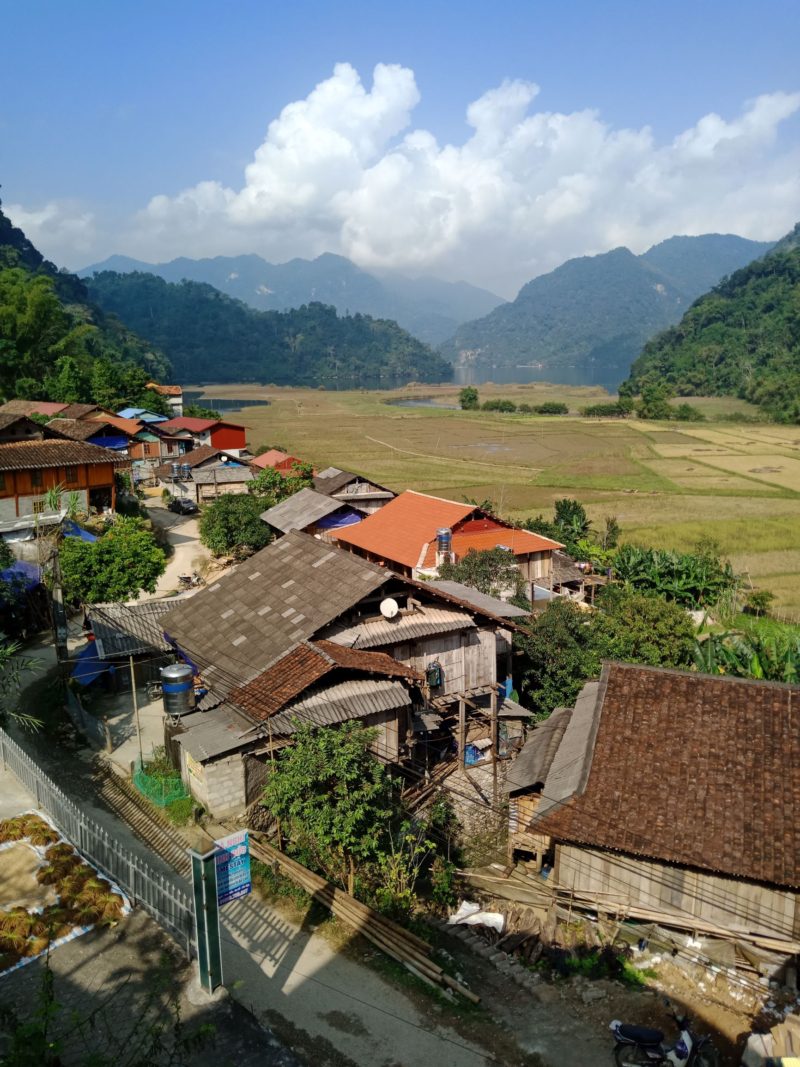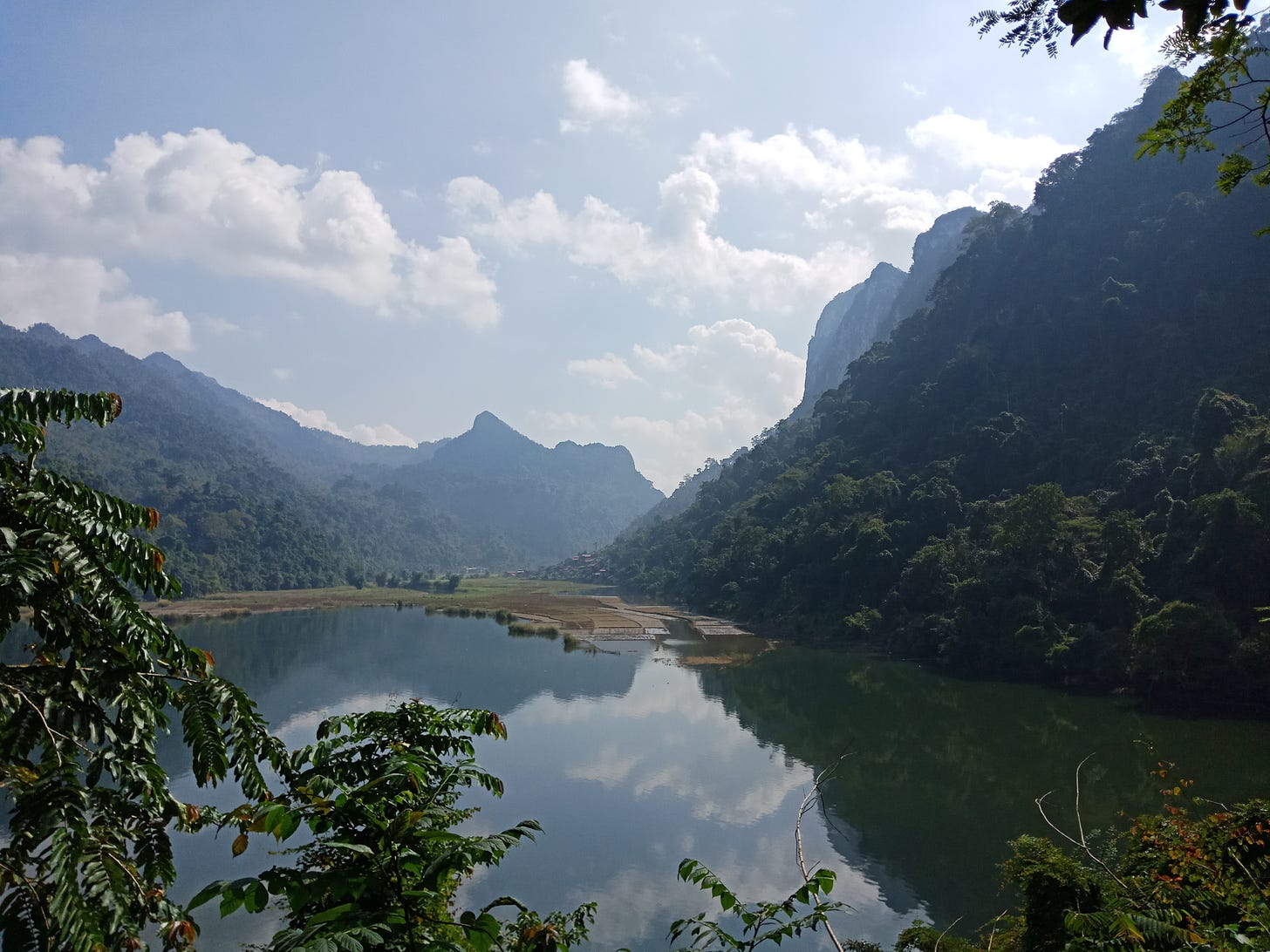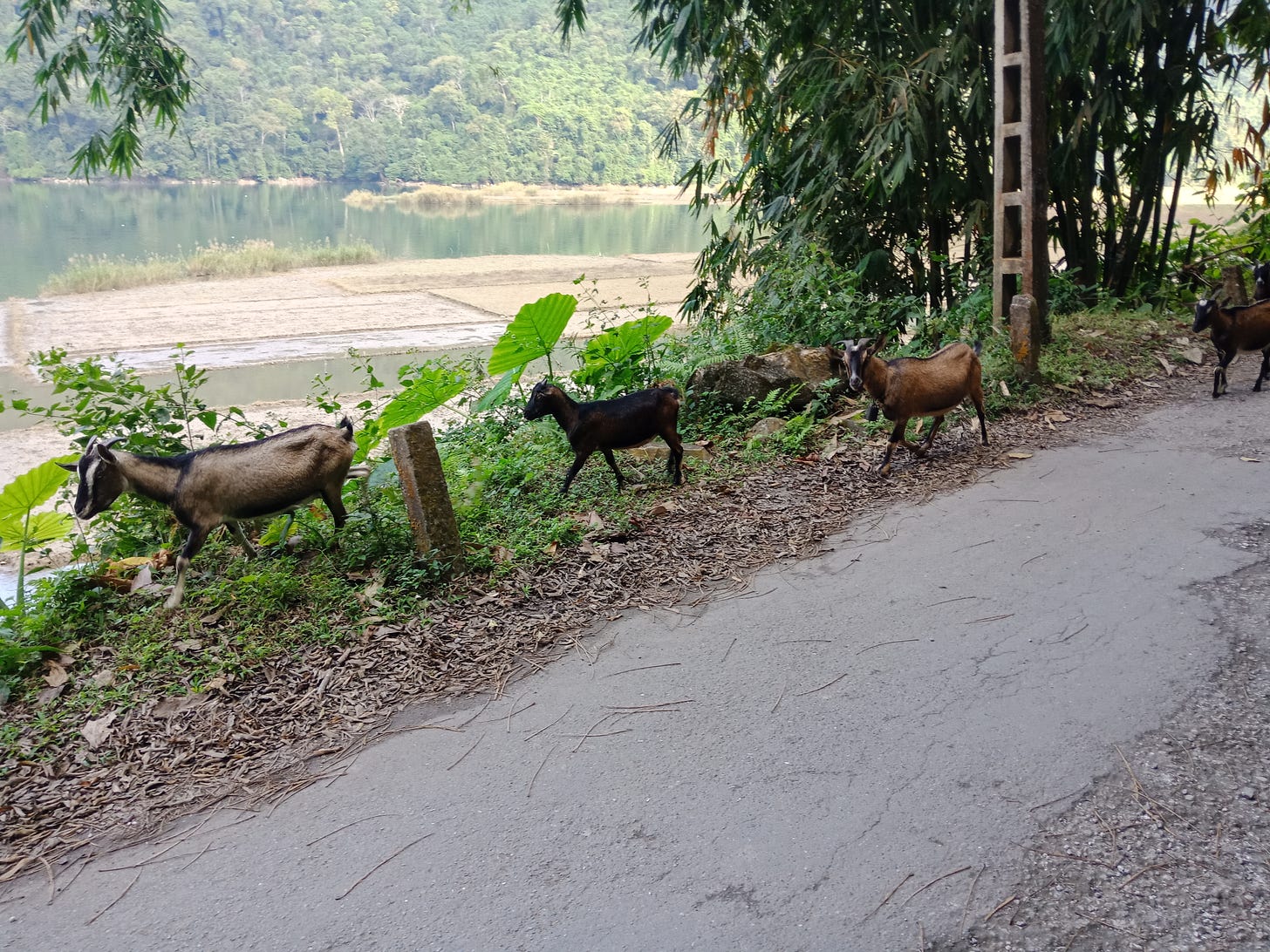
The view from my homestay in Pác Ngòi village, Bắc Kạn province, Vietnam. The southern edge of Ba Bể Lake is visible in the background
This is part 2 of a series about a solo motorbike trip I took around north-east Vietnam in December 2018. Each story can be enjoyed alone, and together they form one big over-arching story.
It’s a story about road trips, motorbikes, solo travel and finding yourself on the open road. And of course, it’s about Vietnam.
Sign up for regular essays and stories about travel, the outdoors and the effect they have on us.
The view from the lake
Ba Be lake sits in a deep gorge in Bac Kan province in northern Vietnam, surrounded by vast fields of conical mountains covered in thick jungle. The scene from without is of a quintessential Vietnamese landscape, maybe even the archetype of south-east Asia itself. Such scenes are so deeply embedded in the world’s culture that they spring to mind when one hears mention of the region, and an accurate image comes to mind even if one has never been, or perhaps if one has never even seen them in photographs or paintings. From within the mountains jut in at odd angles around the womd-shaped lake, reminding the traveller that stereotypes only convey so much, and in real experience there is always more nuance and depth to individual things. A sense of mythos permeates the valley like a gentle steam evaporating from a bath, the sun ascends the mountains with the passing of the day to burn the mists away.
I take to explore the lake for an afternoon on a plastic orange kayak. The late-autumn sun hangs over the shoulders distant mountains, a tortoise-like trajectory lighting up the different corners of the valley in different ways at different hours of the day. The mountains and clouds obscure the passage of light such that the liquid-golden reflection hits the lake at different points, but also doesn’t hit the surface at all. It remains suspended in the air, like I’m looking at the lens flare on a printed photograph.
I paddle slowly and methodically, in no great rush anywhere, though still with the nagging feeling of my trip needing a destination in order to be content. I relieve this with short breaks taken from my kayak. Other vessels pass by my kayak, at turns either local fishermen or tours carrying small groups on rusting motorised tug-boats with flat rusty roofs, the lake’s expanse allowing safe distance of hundreds of metres. My concern isn’t a collision however, only the interruption brought by the noise pollution of enthusiastic engines.
Each section of the lakeside environment catching light in different ways and from different angles and distances so they look like different photos edited together, different views, different scenes. The strands of light have all travelled different lengths of negligible difference in length in the context of how far they’d come from the sun, but the differences are great when seen by a human being, in this valley much vaster than him, each mountain looking like it was taken from a different image and put side by side. And yet all of it exists and breathes as one coherent piece, the contours of the jungle and the hills seeming to rise and fall like giant green lungs as the wind passed over them, inhaling and exhaling gently, massively.
Lake versus shore
My slow persistent uncovering of the map of the lake’s surface takes me past the village I passed through earlier, where I’d stopped for a small can of beer on my futile and sweaty walk around the part of the lake’s perimeter. The view is different now. The village with the jetty takes on new light, assumptions projecting from my hanging head coming half-formed into the world and easily joining the collective consciousness of cliché; what had been dismissed in a self-centred fog as ‘sleepy’ now comes to life; what is viewed with weary indifference by a dissatisfied and self-centred tourist, is now seen with its full and complete spirit alive. Perhaps it was built by people who saw its true essence from the lake each day or on their original arrival.
A primary school lay through a clearing of trees, colourful class-made decorations and drawings papering over the same distinctive fading ochre as every other school in the country, the same shade as many of the state buildings in the capital which have been repurposed over the years from grand old French colonial houses. From its proper vantage point right in the middle of the lake, however, I could now where it sat in right on the edge of the lake, magnificent looking, almost like a benign and welcoming castle, it’s position seeming to be perfectly placed for the children to gain the majority of their education from exposure to the lake itself and the mountainous jungle.
A small cave cast in sunlight opens into the rock that forms a barrier between tree and earth and water; there are two. They are small, with two stumpy stalactites hanging in the larger opening. The space is big enough for a kayak. There’s an overhanging boulder at the entrance which shows a shallow fissure all the way across. Will it fall? No-one would find you if it caved in. It won’t fall. Around the corner, so dark beyond that no light reaches it, although it’s mere metres from the small part that does. The cave continues into pitch dark, disappearing beyond where one could even comprehend whether it’s due to physical space or simply the absence of light. Continuing to follow the path of the cave brings clear danger, of the type of not knowing what lies within its darkness. The view back across the lake is one of ultimate glory, a scene of timeless nature, the only man-made artefact a grand pagoda of indeterminate age far on the distant shore, a cultural archetype of similar strength as the landscape.
When I leave the cave I find a rock, and declare it my destination, for the untethered peace of floating on the lake is too much for my rational brain to allow, a form of peaceful chaos in itself. I abandon all cynicism and cliché and naively practice some meditation, and when I return to the lake I am freed of all the weight of my consciousness, free to float in the light.
A Link to the Past
Long ago, in the beautiful kingdom of [Ba Bể] surrounded by mountains and forests… legends told of an omnipotent and omniscient Golden Power that resided in a hidden land. Many people aggressively sought to enter the hidden Golden Land… But no-one ever returned. One day evil power began to flow from the Golden Land… so the king commanded seven Wise Men to seal the gate to the Land of the Golden Power. That seal should have remained for all time… But, when these events were obscured by the mists of time and became legend… A mysterious wizard came to [Ba Bể] to release the seal. He eliminated the good King of [Ba Bể]. Through evil magic, he began to make descendants of the seven wise men vanish, one after another. And the time of destiny… is drawing near.*
A boy awakens to rain in the middle of the night. His uncle has gone off to fight some evil being, yet hasn’t returned. He hears a call from a princess locked in the dungeon of the castle, and gets up to leave the house. Whether a fascination with the stories told to him by those who came before, or an innate human knowledge of things play out, he goes to leave the house, knowing what he must do.
*From The Legend of Zelda – A Link to the Past
Back to reality
In between the periodic return to reality forced by the passing put-put of the boats, there is no evidence that binds one to a particular moment in time nor the present day, no markers of technology. The buildings on the shore could be a year old or a thousand; the pagoda and the mountains joint symbols of antiquity and far beyond. Is it possible to travel through time – if not a temporary wholesale uprooting of one’s existence and placement into another era, then at least a temporary detachment of a consciousness completely detached from all tangible markers of society?
And if one were to travel through time in the woods and no-one else is around to observe otherwise, is it possible to say for sure that he or she never did? Cut-off from cultural and technological interference in the narrow confines of a light-infused cave, or a quick escape within the short intervals wherein passing fades in and out of consciousness, is it possible to be completely cut adrift, to be cut off even from the present moment?
The setting sun hangs delicately over the mountains to the west for what seems like an eternity. As I return to shore, dragons’ heads tend to form in the conglomeration of leaves and trees. It’s a common phenomenon in this country. In the same way we see familiar shapes and faces in clouds, when gazing at masses of forests or jungles the faces tend to look like the cultural image of the dragon’s head as seen in festival celebrations and traditional pageants. Archetypes that predate all stereotypical images of cultural celebrations seem to form as emergent properties of the surrounding environment. It does make you wonder if you see the familiar or if everything you think is familiar is influenced by the beings that are staring down at you every whenever you are rebellious enough to set aside time to spend in untouched natural places.
For now, the natural surroundings of the lake area are protected by Ba Bể’s National Park status, though there are wolves at the door. From within, inhabitants must forge out a living whatever way they can, and extensions to their circumstances are built with extra floors to their homes, space for foreign guests from Hanoi and abroad to eat or rest or make their own form of retreat from their lives.
The lake area is connected by a new airstrip-like roadway of several kilometres that seems curious in its absence of urban development, the sort of bland road that normally is adorned by apartment blocks and retail parks, a man-made lifeline to external resources but one which is a double-edged sword. Outside the formal gates of the park, on the edge of Cho Ra town, vast mega-hotels are being built, and great big airstrips to nowhere are ominous when one sees their development potential, afforded no cultural, natural nor heritage status. And of course, statuses can change. For now, the Golden Power protects the inner realm from the dark forces which would seek to manipulate or destroy it. But who knows when the seal will be broken, or if the hero will wake up in the middle of the night.
Explanations
I’m listening to a podcast where guest and host discuss the existence of caves in India which may house such powers that raise the level of consciousness of those who crawl inside. The host, being of ethical intent and a more scientific perspective, offers plausible and rational explanations to the guest and audience. These relate to the particular rock that forms these caves possibly being conducive to particular sound frequencies which have resonant effects in human brains, or the facilitation of great and unusual silence on the temporary dweller causing the same changes. The guest, of a more spiritual and relaxed disposition, merely attests to the fact that these caves exist and may have caused changes in him, and describes other such caves he has ventured into which have probably had similar effects. The conversation is of a cordial nature and the matter is not argued over or dwelt on, though it seems that the guest is more certain of the effects of such magical caves, the host can only wonder as the conversation drifts on.
Continue reading:
Part 1: Meditation
Part 3: Sprawl
Part 4: Dreams
Part 5: Motorbike
Part 6: Return
If you enjoyed this, then why not sign up for my free regular newsletter. Essays and stories about travel, the outdoors, and stuff that’s good for your general well-being.
Or follow along on:

